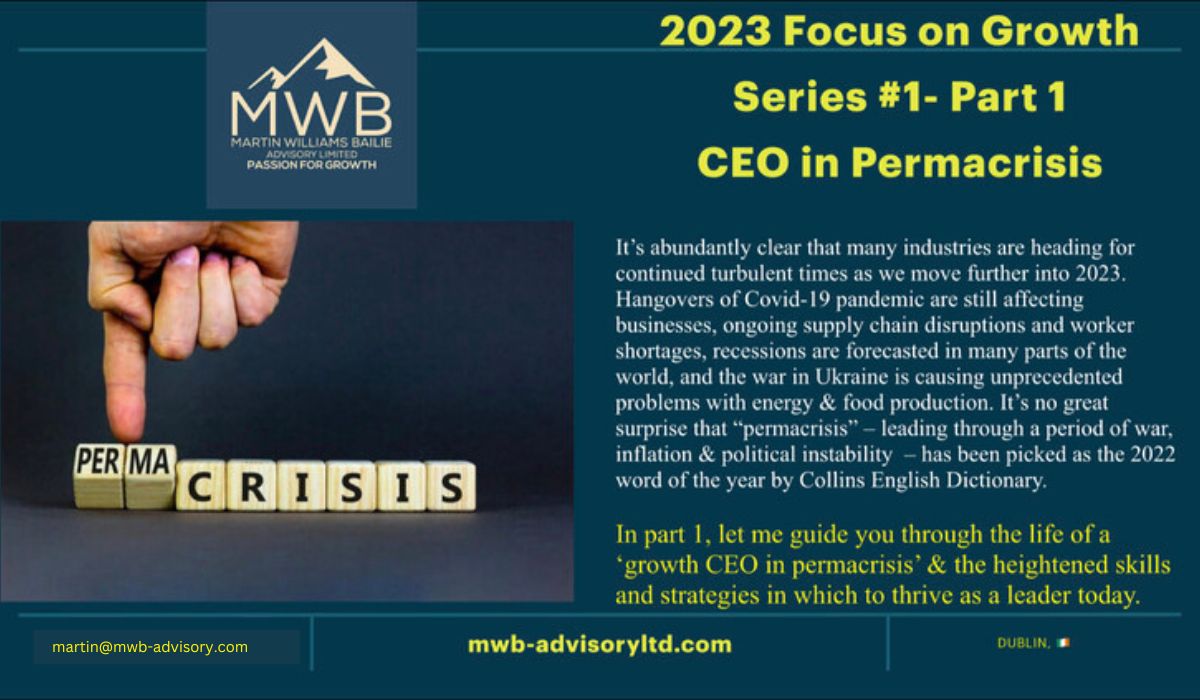
It’s abundantly clear that many industries are heading for continued turbulent times as we move further into 2023. Hangovers of Covid-19 pandemic are still affecting businesses, ongoing supply chain disruptions and worker shortages, recessions are forecasted in many parts of the world, and the war in Ukraine is causing unprecedented problems with energy & food production. It’s no great surprise that “permacrisis” – leading through a period of war, inflation & political instability – has been picked as the 2022 word of the year by Collins English Dictionary.
In part 1, let me guide you through the life of a ‘Growth CEO in permacrisis’ & the heightened skills and strategies in which to thrive as a leader today.
The state of crisis, without systemic, adaptation-oriented transformation, may never be over. Pursuing long-term goals while adjusting for short-term emergencies is challenging and requires significant changes in the way CEOs think & act with every one of their stakeholders.
CEOs can navigate today’s permacrisis and position their company for long-term success, resilience and GROWTH by;
- Prioritise agility: CEOs should prioritise agility in their decision-making and operations to be able to respond quickly to changes in the market and adapt to the new normal.
- Foster innovation: encourage innovation to develop new products, services, and business models that are more resilient to disruption.
- Focus on customer needs: prioritise the needs of their customers and adapt their business strategies accordingly.
- Strengthen supply chains: strengthen their supply chains by diversifying their sources, building resilience and redundancy, and leveraging technology.
- Empower employees: empower employees to take ownership of their work, be more autonomous, and adapt to changing circumstances.
- Build strong partnerships: build strong partnerships with other companies, industry organisations, and government agencies to collaborate and share resources.
- Foster a strong culture: that priorities communication, transparency, and resilience.
- Emphasise financial sustainability: ensure the long-term financial sustainability of their company by reducing costs, streamlining operations, and exploring new revenue streams.
- CEOs should leverage technology to enhance their business operations, better serve their customers, and stay ahead of the competition.

Leading in today’s permacrisis requires a new set of skills and strategies. Here are ways to lead effectively during these challenging times:
- Prioritise empathy and understanding: leaders should make an effort to understand the needs and concerns of their employees, customers, and stakeholders.
- Practice effective communication: clear and transparent communication is crucial during a permacrisis. Leaders should be open and honest about the challenges the Organisation is facing, as well as the steps being taken to address them.
- Foster a culture of resilience: by setting an example of resilience and encouraging employees to be flexible and adaptable, leaders can help build a resilient culture within the Organisation.
- Invest in employee development: investing in the development of employee’s skills and knowledge can help prepare them for new challenges and opportunities that arise during a permacrisis.
- Focus on innovation: leaders should encourage creative thinking and innovation to help their organisations stay ahead of the curve during these turbulent times.
- Collaborate and build partnerships: by working with other organisations, leaders can leverage their collective resources and expertise to overcome challenges and create new opportunities.
- Stay informed and be agile: in a permacrisis, the situation can change rapidly, and leaders must stay informed and be willing to pivot their strategies quickly in response to changing conditions.
CEOs growth and ultimate success will have to both “learn to prepare”, i.e. invest in strategic foresight, agility and so-called “optionality” to enhance preparedness; and “prepare to learn” on the go, when a crisis inevitably hits….multiple times!

